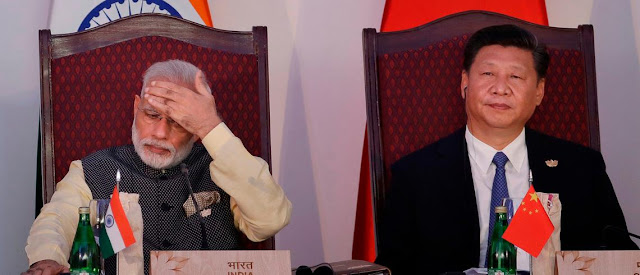Does China need India?
China and India stepped back from the brink, at least for the moment. But the flare-up in June - and indeed the ongoing tensions - has strained relationships and nudged India closer to the United States. But, not many people in India would readily buy the argument that India should become a member of the Quad (a grouping of United States, Japan, India and Australia for the control of Indo-Pacific) to face-off China. For them, it really means Indian lives and India's prosperity are put in the line for containing China. Despite all the public outrage at China's misbehaviour and even with all the forthcoming bollywood fare trashing China, that would be a hard sell in India.
Indian leaders, despite their almost pagan love for spectacles, are realists. Even though they sell to the public India's impending great power status, they are well aware of the constraints that India's divided polity, widespread poverty and lack of productive manpower impose. For all the transformative politics of the recent years, Indian institutions, particularly its Civil Service, continue to carry around the legacy of slavish acceptance of Anglo-American concepts and resentment towards Anglo-American leadership. Therefore, India is unlikely to join the Anglo-American camp any time soon and despite the overtures, will remain suspicious of the commitments and real intentions of the other members of the Quad.
So, despite the misgivings, India is China's to lose.
It's rather baffling, therefore, why we have had the conflict in June. Barring some unexpected turn in the future, it seems to be totally unintended. Both sides refrained from inflaming the public sentiment too much. The Indian Prime Minister has even made the unexpected statement that there was no incursion by the Chinese and the Chinese have not claimed any incursion by the Indians, making the incident - which claimed the lives of at least 20 Indian soldiers and possibly of as many on the Chinese side - an undisciplined brawl on a dangerous terrain. [This is, of course, highly unlikely. Both the Indian Army and the PLA are highly disciplined entities, so much so that even in the middle of this deadly fight, no one seemed to have drawn the guns they have been carrying or had access to.]
With limited details available so far, there is little point speculating what happened. But to judge by what followed, it seemed neither side wanted a conflict. Aside from making enemies on all fronts, India matters to China, though that point is underappreciated in Beijing. This is not about India's inflated sense of being a superpower in waiting (it's not) or its consumer market (it's vast, but too poor for most foreign companies and a fraction of China's exports), but as the great connector. Even in the animosity that has built up since 1962 (or even earlier, since 1839 when the Indian sepoys complemented the British gunboats), China has seen India as an agent of West. Take away that resentment and a confident China would see India for what it is: It's China's bridge with the West.
For some who have too much faith in the world of instant information, this may seem dated. The modern China is actually far more economically connected with the West than India and the road from Shanghai to the West certainly doesn't go through Mumbai. But it would be ironic to put too much faith on the integrative power of economic interest just as we live through the decline of 90s style go-go globalization; we know geography and culture strike back ever so often. This is a moment of history, when we speak about 'decoupling' of China and the West. On the same token, this is the time to recognise India's historical role as a great global connector.
By its geography and culture, India sat at the crossroads of the civilisations. It has connected economically and culturally the world of Indian Ocean and that of Silk Roads, and sat at the centre of the world when the busy maritime life of the Indian Ocean was considered. Therefore, China's gamble on Eurasia, resurrection of the historic Silk Route and greater integration of Indian Ocean and the Pacific are all lame without India as a full and willing partner. India just can not be wished away or dismissed if China has to shift the balance away from the Atlantic world and challenge the Anglo-American hegemony. Without India, China will never be fully connected or complete.
One final point: This is not an one-way street and Mumbai needs Shanghai too. India suffers a jealousy of trade and resent the fast growth and power of China, but caught in the Anglo-American idea universe, it makes no attempt to understand China. Chinese history, literature and philosophy are studied in America better than in India. This culture of disengagement is usually blamed on 1962 and on China's closeness to Pakistan, but neither British colonialism nor American indulgences of Pakistan have ever discouraged Indians from seeking out Anglo-American ideas. This needs changing and India's grand strategy - which must involve leveraging its population (more on that in a later post) - must involve knowing about and engaging with China, even if that involves challenging its practices from time to time. It's the other side of the coin: Without China, India may never be prosperous or at peace.


Comments